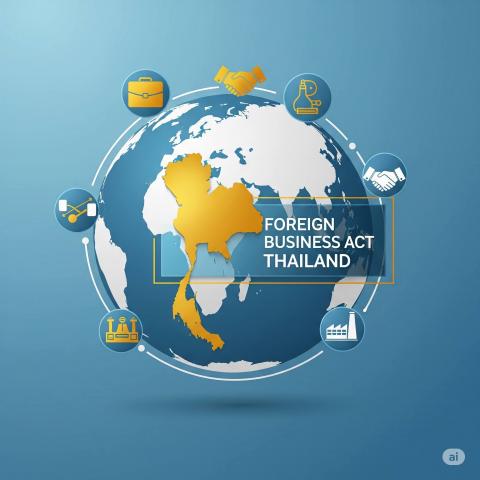Navigating Manufacturing Licenses in Thailand for Foreign Investors
Thailand presents a strategic location for foreign businesses looking to establish manufacturing operations in Southeast Asia. However, setting up a factory requires a thorough understanding of Thai law, particularly the Factory Act, and the acquisition of the appropriate manufacturing license (often referred to as a factory license or Ror Ngor 4). PS Law & Business offers specialized legal assistance to guide foreign entrepreneurs through this complex process, ensuring compliance and a smooth market entry.
Understanding Thailand's Factory Act and License Types
The primary legislation governing factory operations in Thailand is the Factory Act B.E. 2535 (1992), as amended. This Act categorizes factories based on their potential environmental impact, size, and type of machinery used. Generally, factories are classified into three types:
- Type 1 Factories: These are small-scale operations with minimal potential for environmental impact or nuisance. They can typically operate without a formal license but must still adhere to specific ministerial regulations and notifications.
- Type 2 Factories: These factories have a greater potential to cause nuisance or environmental impact than Type 1. They do not require a full license but must notify the relevant authorities prior to commencing operations and comply with prescribed conditions.
- Type 3 Factories: These are larger-scale operations or those with significant potential for environmental impact or public hazard. Type 3 factories require a factory license from the Department of Industrial Works (DIW), Ministry of Industry, before they can begin operations. The process for obtaining this license is more stringent and involves detailed submissions and inspections.
For most foreign investors establishing significant manufacturing facilities, a Type 3 license will be necessary.
Key Steps to Obtain a Manufacturing License (Type 3)
The process of obtaining a manufacturing license in Thailand involves several key stages:
- Company Registration: You must first establish a legal entity in Thailand (e.g., a Thai limited company).
- Location Selection & Approval: The chosen factory location must comply with zoning laws, environmental regulations, and specific requirements based on the type of industry.
- Environmental Impact Assessment (EIA): Depending on the factory's nature and scale, an Environmental Impact Assessment (EIA) or Initial Environmental Examination (IEE) may be required and approved by the Office of Natural Resources and Environmental Policy and Planning (ONEP).
- Preparation of Application Documents: This includes detailed factory layout plans, machinery specifications, safety protocols, pollution control measures, and corporate documents. These documents often require certification by qualified engineers.
- Application Submission: The complete application is submitted to the Department of Industrial Works or the Provincial Industrial Office.
- Factory Inspection: Officials will conduct an on-site inspection of the proposed factory to ensure it complies with the submitted plans and all relevant regulations.
- License Issuance: Upon successful inspection and approval of all documentation, the factory license is issued. This license is typically valid for five years and must be renewed before expiry.
Considering BOI or IEAT Benefits
Foreign investors may also explore incentives offered by the Thailand Board of Investment (BOI) or consider locating their factory within an Industrial Estate Authority of Thailand (IEAT) zone.
- BOI Promotion: Obtaining BOI promotion can offer significant advantages, including tax incentives (corporate income tax holidays, import duty exemptions on machinery and raw materials), permission for 100% foreign ownership, and streamlined processes for visas and work permits for foreign staff. Manufacturing activities are often eligible for BOI promotion.
- IEAT Zones: Locating a factory within an IEAT managed industrial estate offers benefits such as pre-approved locations for industrial activities, simplified permit processes, access to well-developed infrastructure, and often, permission for foreign land ownership within the estate.
PS Law & Business can advise on eligibility and assist with applications for BOI promotion or setting up in an IEAT zone.
How PS Law & Business Can Assist
Our team of experienced business lawyers provides comprehensive legal support for obtaining your manufacturing license in Thailand, including:
- Advising on the appropriate factory license type and legal structure.
- Assisting with company registration in Thailand.
- Guiding you through the complexities of land acquisition or leasing for industrial purposes.
- Coordinating with environmental consultants for EIA/IEE reports.
- Preparing and reviewing all necessary application documents for the factory license.
- Liaising with the Department of Industrial Works and other relevant government agencies.
- Assisting with BOI promotion applications and IEAT procedures.
- Providing ongoing legal advice on compliance with Thai labor laws, environmental regulations, and other operational requirements.
Navigating the legal landscape for manufacturing in Thailand can be challenging. With PS Law & Business, you gain a trusted partner dedicated to ensuring your venture is established legally and efficiently, allowing you to focus on your core business operations.
Frequently Asked Questions (FAQ)
Q1: Can a foreigner own 100% of a manufacturing company in Thailand?
A: Yes, generally, manufacturing activities are not restricted under the Foreign Business Act, allowing for 100% foreign ownership. Furthermore, promotion by the Thailand Board of Investment (BOI) often explicitly permits full foreign ownership for manufacturing projects.
Q2: How long does it take to get a manufacturing license in Thailand?
A: The timeframe can vary significantly depending on the factory type, complexity, location, and completeness of the application. For a Type 3 license, it can take several months, potentially longer if an EIA is required. PS Law & Business strives to expedite this process through meticulous preparation and proactive communication with authorities.
Q3: What are the main documents required for a factory license application?
A: Key documents typically include company registration documents, land title deed or lease agreement, factory building plans, machinery layout and details, environmental protection plans, safety plans, and an EIA/IEE report if applicable. All technical documents usually need certification by a licensed Thai engineer.
Q4: Do I need a separate license if I expand my factory?
A: Yes, if you plan to expand your factory premises, increase machinery horsepower significantly, or change your manufacturing process in a way that alters your license conditions, you will likely need to apply for a factory expansion permit or a new license.
Q5: What are the consequences of operating a factory without the correct license?
A: Operating a factory that requires a license without obtaining one, or breaching the conditions of an existing license, can lead to severe penalties, including fines, imprisonment, and factory closure orders. It is crucial to ensure full compliance with the Factory Act.
External Links for Further Information:
- Department of Industrial Works (DIW), Ministry of Industry (Note: Website primarily in Thai, some English information may be available)
- Thailand Board of Investment (BOI)
- Industrial Estate Authority of Thailand (IEAT)
- Office of Natural Resources and Environmental Policy and Planning (ONEP) (for EIA related information)




